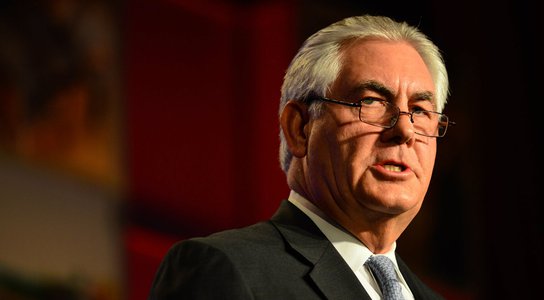The U.S. Senate Committee on Foreign Relations must probe ExxonMobil’s record of questionable oil deals, attempts to undermine anti-corruption policies and allegations of misleading the public on climate change, Global Witness said today.
“There are grave national security issues at stake here, and the U.S. public deserves answers. Global Witness has repeatedly exposed questionable deals between ExxonMobil and autocratic, oil rich regimes which have fueled instability and entrenched poverty in some of the world’s most volatile regions. Under Tillerson’s watch, ExxonMobil has led efforts to gut policies designed to reduce corruption, and is also under investigation for misleading the public about what the corporation knew about the threat from climate change,” said Corinna Gilfillan, Head of Global Witness' U.S. office.
Global Witness investigations show how ExxonMobil and its related corporate predecessors have engaged in questionable transactions with governments of oil-rich countries, including Nigeria(1), Kazakhstan (2), Equatorial Guinea (3), Angola (4) and Chad. Yesterday USA Today reported allegations that ExxonMobil also did business with Iran, Syria and Sudan through a European subsidiary while those countries were subject to U.S. anti-terrorism sanctions, according to Securities and Exchange Commission filings (5).
ExxonMobil is also undermining the U.S. government’s commitment to a more transparent natural resource sector by refusing to disclose payments as part of the landmark global initiative called the Extractive Industries Transparency Initiative (EITI) (6), which requires member companies to report the payments they make to governments. Other oil companies, including BP and Shell, have done this in the U.S., while ExxonMobil continues to refuse.
At the same time, ExxonMobil is one of the leading companies in the fight against a landmark U.S. law which would bring the notoriously murky oil industry into the open. The implementation of the bipartisan law, known as the Cardin-Lugar Amendment in the Dodd-Frank Act, was delayed due to vehement opposition from the oil industry lobbying group American Petroleum Institute, of which Mr. Tillerson was a member of the executive committee and a former chairman, and ExxonMobil is a member.
“We are concerned about how Tillerson will disentangle from the web of Exxon’s influence and put American interests first. It is critical that our future Secretary of State acts in the interests of all Americans,” said Gilfillan.
The hearing will take place on Wednesday, January 11 at 9:15 in Dirksen 106.
Also see our op-ed, originally published in the Morning Consult.
/ ENDS
NOTES TO EDITOR:
(1) See Global Witness briefing, “Probe into murky ExxonMobil deal shows why strong U.S. transparency rules are needed for oil companies.”
(2) See Global Witness report Time for Transparency (2004) pp. 7-17. One of the largest ever foreign corruption investigations in US history targeted a middleman who received payments from Mobil (now ExxonMobil) intended for the Kazakh government, but kickbacks were skimmed for the Kazakh president (p.4).
(3) See Global Witness Time for Transparency (2004) pp. 55-64
(4) See Global Witness Angola, A Crude Awakening – The Role of the Oil and Banking Industries in Angola’s Civil War and the Plunder of State Assets (December 1999),
(5) ExxonMobil told USA Today “the transactions were legal because Infineum, a joint venture with Shell Corporation, was based in Europe and the transactions did not involve any U.S. employees.”
(6) See Global Witness press release.
/ ENDS
Contacts
You might also like
-
Press release Rex Tillerson shares Exxon’s tax transparency problems
US citizens need to know that the people running our country respect the fundamental principles of our democracy. So it matters that former Exxon CEO Rex Tillerson is refusing to provide his tax returns before becoming US Secretary of State.
-
Report Time For Transparency
Coming clean on oil, mining and gas revenues.
-
Press release Global Witness opposes Nomination of Exxon CEO as US Secretary of State
US President-elect Donald Trump’s nomination of ExxonMobil CEO Rex Tillerson as Secretary of State would pose a grave threat to both US and global security and should be rejected by the Senate